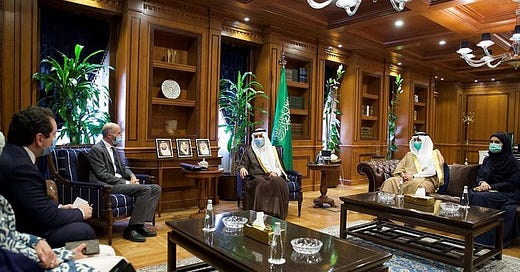US envoy: 'Deep and growing concern' about Iranian intentions in delaying return to nuclear talks
'At this point it’s hard to find…an innocent explanation for why they are taking so long,' US Iran envoy Rob Malley said.

The top US diplomat on Iran said today that the United States, Europe and Iran’s Gulf neighbors increasingly share “deep and growing” concern about the pace and intent of Iran’s nuclear program, and impatience over Tehran’s excuses for delaying a return to nuclear talks.
US Iran envoy Rob Malley spoke shortly after Iran’s ultra-hardline new nuclear negotiator, Deputy Foreign Minister Ali Bagheri-Kani, said he would travel to Brussels on Wednesday (Oct. 27) to meet with the European Union coordinator of the talks on trying to revive the 2015 Iran nuclear deal that have now been at a standstill since Iranian elections in June.
“I think all of our interlocutors – whether they’re in the region or in Europe – shared deep and growing concern about the pace and direction of Iran’s nuclear progress, particularly at a time when the U.S. has made clear that it is prepared to come back into compliance,” with the Joint Comprehensive Plan of Action (JCPOA), Malley told journalists on a call today (October 25), following a week-long trip to Saudi Arabia, Qatar, the United Arab Emirates and to meet with his European counterparts in Paris.
“At this point it’s hard to find…an innocent explanation for why they are taking so long” to return to talks, Malley continued. “All of our interlocutors felt… that it was imperative to resume the talks in Vienna and in a constructive way as soon as possible.”
While the new, more conservative Iranian President Ebrahim Raisi administration has sought to focus on improving Iran’s relations in the Middle East region over his predecessor’s focus on rapprochement with the West through the nuclear accord, Malley repeatedly emphasized that the US, Europe and the Arab Gulf states were aligning their positions on Iran and would be coordinating closely to try to pressure Iran to return to the table on reviving the accord. Then US President Trump quit the pact in 2018, though Iran had been abiding by it. Since 2019, Iran has been progressively exceeding the deal’s nuclear limits to protest the lack of sanctions relief, expanding its program in ways that Malley warned at some point will make reviving the JCPOA impossible.
Iran has a choice between two alternative paths ahead, the American negotiator outlined. On one path, “Iran and the United States and the other parties…find practical, pragmatic solutions so that Iran would live by the constraints on its nuclear program…and the U.S. would lift the economic sanctions that are inconsistent with the agreement that was reached in 2016,” Malley said. The first path “would also allow countries in the region to develop closer ties economically with Iran,…and that was one of the goals that we heard GCC [Gulf Cooperation Council] countries had. But they also said that they could not do this as long as Iran was not back in the JCPOA.”
“Then there’s the other path, a path that nobody I spoke to was hoping to see come about…which is that Iran chooses a different direction, continues to either delay resumption of talks or comes back with demands that clearly exceed the parameters of the JCPOA,” Malley continued. “We’re increasingly concerned that’s the path Iran is in, and so we had to discuss with our partners and allies our approach to that different reality.”
“It is in Iran’s hands to choose which one it wants to take,” he added.
Iran’s new nuclear negotiator Bagheri-Kani, for his part, said it was for the other JCPOA parties to decide if they were truly ready to fulfill their commitments, including by calling out “the non-participant violator”—the U.S.--for quitting the deal.
“Iran is determined to engage in negotiations that would remove unlawful and cruel sanctions in a full and effective manner, secure normalization of trade & economic relations with Iran, and provide credible guarantee for no further reneging,” Bagheri-Kani said in a tweet threat today announcing his planned travel to Brussels.
“The question is if our partners are genuinely ready to fulfill their commitments, including by calling out the non-participant violator to divorce from the past malign policies and legacy,” the Iranian negotiator continued.

“The continuation of the failed maximum pressure policy definitely will… add more to already existing negotiations’ complexities,” Bagheri-Kani’s thread concluded.
Malley said today that the Biden administration also does not think Trump’s “maximum pressure campaign” has succeeded, and asserted that Pres. Biden is sincere in wanting a mutual return to the nuclear pact.
“Clearly our intent is to be faithful to the deal if we could get back in, and we’ve also said that we don’t think the maximum pressure campaign has succeeded,” Malley said on the call. “Our goal is to turn that page. We’re prepared to turn the page, but we need to turn the page together with Iran, because we need to know that…as we take our steps, Iran will take steps to come back into compliance. This is not something that we can do unilaterally.”
**


